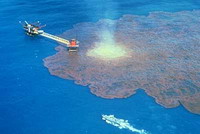Oil spill threatens San Francisco Bay wildlife
Scientist tried to contain the damage from a 58,000-gallon (219,547-liter) oil spill that has stained some of Northern California's coastline.

Sunrise allowed oil skimmers, surveillance flights and shoreline cleanup teams to resume their work mopping up the damage, even as questions persisted about why the U.S. Coast Guard took so long to report the scope of the spill.
The spill, believed to be the biggest in the San Francisco Bay since 1988, has fouled miles (kilometers) of coastline, closed several beaches, canceled weekend outdoor events and threatened thousands of birds and marine animals.
"The effects of the oil spill could persist for months and possibly years," said Tina Swanson, a fish biologist with the Bay Institute.
Local officials and environmentalists criticized the Coast Guard for initially underreporting the amount of oil that leaked when the South Korea-bound container ship struck the San Francisco-Oakland Bay Bridge in dense fog Wednesday morning.
City officials said they were being told more than 12 hours after the incident that just 140 gallons (530 liters) had leaked into the bay.
"We would have responded differently if we had accurate information from the get-go," said Nathan Ballard, a spokesman for Mayor Gavin Newsom.
Rear Adm. Craig Bone, the Coast Guard's top official in California, Nevada, Utah and Arizona, was to "get a firsthand view of what's going on and determine what additional assistance might be provided," said U.S. Coast Guard Petty Officer Kevin Neff early Friday. The White House also asked U.S. Coast Guard officials for briefings on the response to the spill.
The accident did not damage the span, but the vessel's hull was gashed, officials said.
Tides carried a plume of heavy fuel beneath the Golden Gate Bridge and into the Pacific Ocean. By Thursday afternoon, oil had been sighted about 15 miles (24 kilometers) north of the city, and at least eight beaches in San Francisco and Marin County were closed.
Wildlife rescue workers and volunteers combing beaches have found dozens of dead and injured seabirds coated in black oil, said Michael Ziccardi, director of the California Oiled Wildlife Care Network. Ten to 15 teams were to be dispatched Friday to search for more.
More than 30 oiled birds, mostly surf scoters that live on the water's surface, were taken to a mobile treatment center in San Francisco's Fort Mason, Ziccardi said. Most will be taken to a wildlife care center to be cleaned and rehabilitated before being released into the wild.
Wildlife officials are concerned that the region's sea lions and harbor seals could also be affected, though there were no confirmed reports of injured marine mammals. Officials and fishermen also worried that the spill could hurt several species of fish.
Senator Barbara Boxer criticized the Coast Guard's response in a letter sent to Commandant Adm. Thad W. Allen, saying she was "very troubled by the Coast Guard's delay in delivering accurate information to the public and the city of San Francisco. Many questions remain as to why it took an entire day to determine the gravity of this spill."
Coast Guard Capt. William Uberti, captain of the Port of San Francisco, said Coast Guard personnel knew the full extent of the spill by around 4 p.m. He rejected any suggestion that the crews could have contained the spill more quickly.
"We mobilized as if it was a big spill right away," said Uberti.
Some 9,500 gallons (35,960 liters) of fuel was recovered, and 18,000 feet (5,486 meters) of booms were in place by Thursday afternoon, the Coast Guard said.
Authorities were still investigating the cause of the crash.
Subscribe to Pravda.Ru Telegram channel, Facebook, RSS!


